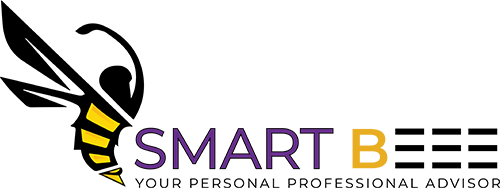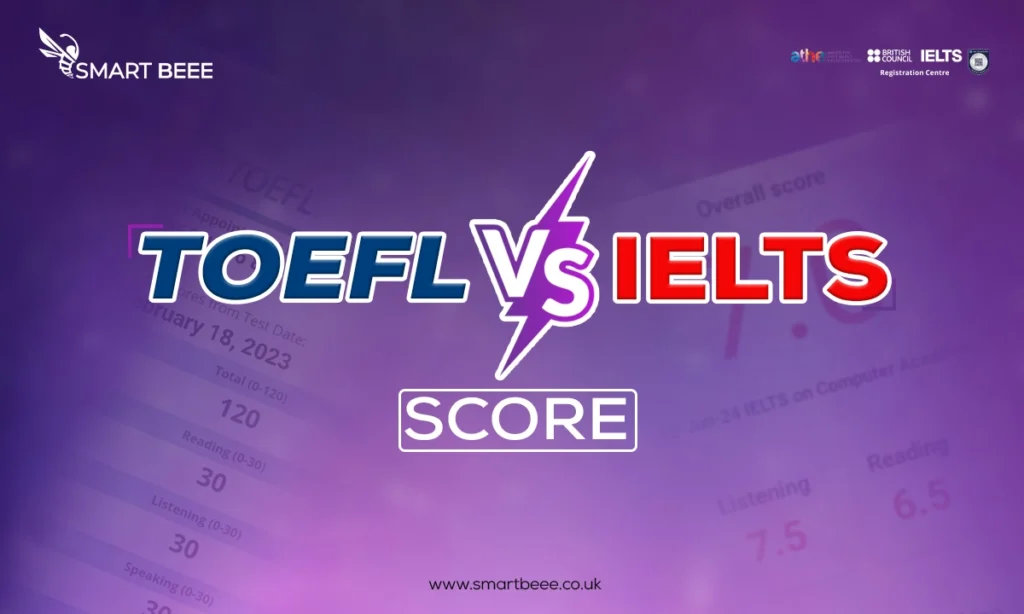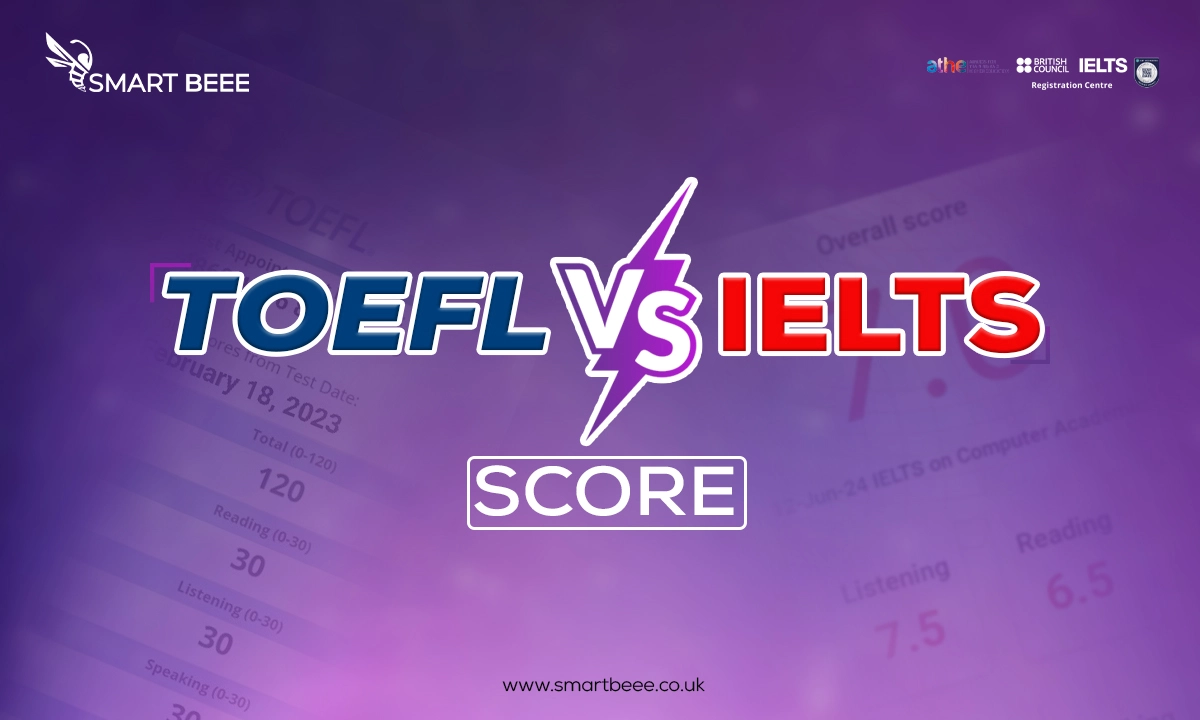TOEFL vs IELTS
Introduction
If you are planning to study abroad, you will often face one big question: TOEFL vs IELTS. Both tests check your English skills. Both are accepted by many universities and colleges around the world. But there are key differences that can affect your choice.
Students often ask: IELTS vs TOEFL which is easier? TOEFL vs IELTS Which is more accepted in Europe? How do TOEFL vs IELTS scores compare? This guide will give you clear answers in simple words.
At SmartBeee, we help students like you every day. We offer study abroad consulting, visa services, and test guidance. With our support, you can choose the right test and move closer to your dream of studying overseas.
What Is TOEFL?
TOEFL stands for Test of English as a Foreign Language. It is run by the Educational Testing Service (ETS). The most common version is the TOEFL iBT (Internet-Based Test).
- Skills tested: Reading, Listening, Speaking, and Writing.
- Format: Most questions are multiple-choice questions.
- Speaking section: You record answers on a computer.
- Best for: Students aiming for universities in the United States or other English-speaking countries.
TOEFL is linked to the Common European Framework of Reference (CEFR). It has wide acceptance in academic institutions across the globe.
What Is IELTS?
IELTS means International English Language Testing System. It is managed by Cambridge, IDP, and the British Council.
- Skills tested: Listening, Reading, Writing, and Speaking.
- Format: Mix of essays, short answers, and problem-solving tasks.
- Speaking test: Done face-to-face with an examiner.
- Best for: Students planning for the UK, Canada, Australia, or Europe.
IELTS is also mapped to the European Framework of Reference. It is one of the most popular English language testing systems for migration and study.
TOEFL vs IELTS – A Quick Comparison
To help you decide faster, here is a clear TOEFL vs IELTS comparison:
| Feature | TOEFL iBT | IELTS |
| Test Type | Internet-Based Test (iBT) | Paper or Computer-Based Test |
| Sections | Reading, Listening, Speaking, Writing | Listening, Reading, Writing, Speaking |
| Speaking Test | Computer-based recordings | Face-to-face with examiner |
| Question Style | Mostly multiple-choice questions | Mix of essays, charts, and short tasks |
| Scoring System | 0–120 scale | 0–9 band scale |
| Duration | About 3 hours | About 2 hours 45 minutes |
| Popular In | USA and English-speaking countries | UK, Canada, Australia, and Europe |
| Best For | Academic-focused test takers | Real-life communication-focused students |
This table shows the most important points when comparing TOEFL and IELTS scores, styles, and formats.
IELTS vs TOEFL Which Is Easier?
Many students want to know, IELTS vs TOEFL which is easier? The truth is, it depends on you.
- If you like structured tests with multiple-choice questions, the TOEFL may feel easier.
- If you are confident in face-to-face speaking skills, IELTS may be the better choice.
- TOEFL is more academic in style. IELTS feels more real-world and practical.
At SmartBeee, we can help you try practice tests for both. That way, you can see which exam matches your strengths.
TOEFL vs IELTS Score Explained
Both TOEFL and IELTS scores show your English level. But the scoring systems are very different.
- TOEFL score range: 0–120.
- IELTS score range: 0–9 bands.
Here is a guide to compare TOEFL vs IELTS scores with the European Framework of Reference:
| IELTS Band Score | TOEFL iBT Score | CEFR Level |
| 9.0 | 118–120 | C2 (Expert) |
| 7.5–8.5 | 102–114 | C1 (Advanced) |
| 6.0–7.0 | 60–93 | B2 (Upper-Intermediate) |
| 4.0–5.5 | 32–59 | B1 (Intermediate) |
| Below 4.0 | Below 32 | A1–A2 (Basic) |
This table makes it easier to compare your TOEFL and IELTS scores directly.
TOEFL vs IELTS Which Is More Accepted in Europe?
One key question is TOEFL vs IELTS which is more accepted in Europe. The answer is:
- IELTS is widely accepted in the UK, Ireland, and across Europe.
- TOEFL tests are also recognised, but many European universities prefer IELTS.
- For student visas in the UK, IELTS is usually required.
That is why many students aiming for Europe choose IELTS over TOEFL.
TOEFL vs IELTS – Key Factors to Think About
When choosing between IELTS and TOEFL, think about these points:
- Target countries: the UK, Canada, and Australia favour IELTS. USA prefers TOEFL.
- Speaking test style: TOEFL uses a computer; IELTS uses a real person.
- Your strengths: Strong in essays? Both are fine. Strong in multiple-choice? TOEFL may be easier.
- Test availability: Check which exam has centres near you.
- Visa and migration: IELTS is often required for the UK and Australia.
IELTS vs TOEFL – Which One Should You Choose?
Still wondering IELTS vs TOEFL which is easier? Here’s a simple way to decide:
- Choose TOEFL if you want:
- An academic-style test.
- To study in the United States.
- To answer mostly multiple-choice questions.
- Choose IELTS if you want:
How SmartBeee Helps You With TOEFL and IELTS
At SmartBeee, we guide you through every step of your study abroad journey.
Here’s what we do:
- Give advice on choosing between IELTS and TOEFL.
- Support with test preparation and practice resources.
- Help with university applications in the UK, USA, Canada, and Europe.
- Offer visa consulting and student counselling.
- Provide one-on-one support for students from Bangladesh and beyond.
With us, you don’t just pass an exam. You move closer to your dream university.
Final Thoughts on TOEFL vs IELTS
Both TOEFL and IELTS are strong English proficiency tests. The right choice depends on your study goals, country preference, and test style.
- For the USA – TOEFL is the safe choice.
- For the UK, Canada, and Europe – IELTS has wider acceptance.
- If you like computers and multiple- choice – Pick TOEFL.
- If you prefer face-to-face speaking – choose IELTS.
If you are still unsure about TOEFL vs IELTS score, IELTS vs TOEFL which is easier, or TOEFL vs IELTS which is more accepted in Europe, our team at SmartBeee is here to guide you.
👉 Contact SmartBeee today and let us help you prepare for the right test, apply to the best universities, and secure your student visa with confidence.




